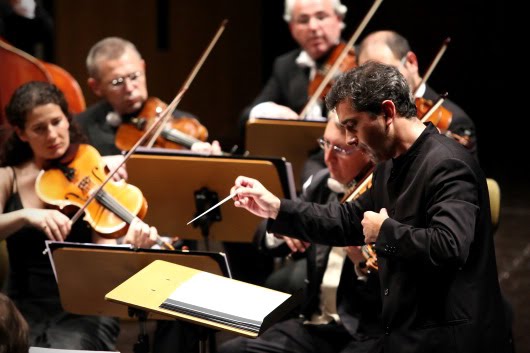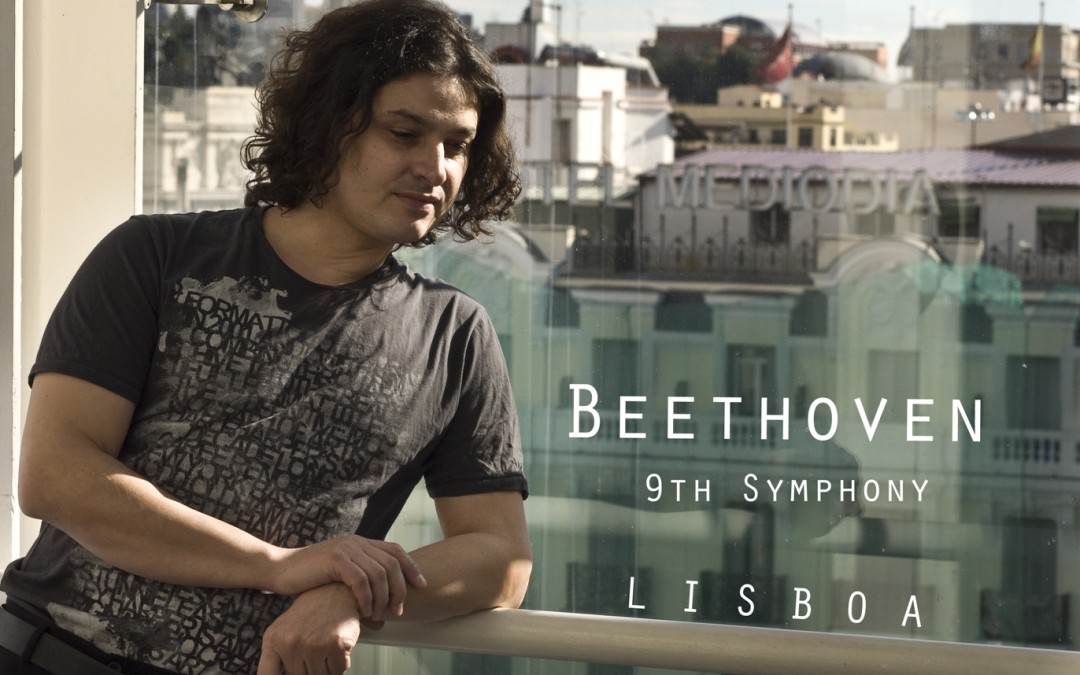The way a solo artist is finally convinced, in case he had any doubts, that he is, precisely that, a guy who remains alone just doing what he is doing: approaching Beethoven’s Ninth Symphony. Maybe he has a choir of about 80 people that are around 15 meters away drawing up a straight line from a neck that is better not to scratch. Around him, a symphony orchestra that comes marching by from three movements ago with a whole artillery of musicians riding on their instruments and gliding through the air between a muddle of arches, arms and metals against a director who has no choice but to have brought from home his vital pulse.
Moreover, there is a moment when, both the musicians and the public, jointly interpret the same part of the score written by Beethoven, and that quite agree with all three silences that concern all of the sound before the baritone starts singing without more accompaniment than their glances. Such a silence, that is only reached after so much music happens, is similar to the crest of the wave before resolving in a water tube. There is a moment of weightlessness and free fall where baritones climb ahead to sweep away lots of years in which symphonies were silent regarding to singing. What is then heard, said in a German language which, since then, has met every accent is “Oh friends…” that is the beginning of what will be the end to which we arrive wanting to postpone it.
I have never met anyone that after this work does not have the need to share a few beers, a walk or a hug. Perhaps we cannot see this as, sometimes, people dismiss at the ending of the concert politely and march the path that leads them to their lives, leaving behind the gift that we all have made to ourselves. But if wishes and desires took a break, we would find all cafes overflowing with the joy that a guy, apparently shy and unsuccessful in life, left us spread in his last symphony in such a way that always feels like brand new. There is something enigmatic in knowing that the music that reintegrates us in what is human and gives us back part of what we are, is always heard as a premiere.
After Beethoven, I often think about Beethoven, and I miss him and I have the idea that it would be nice to send him an email to thank him about all of that, we really do not know how to name, but it is what is left after giving life to his works and that we then drag to breakfast, in the same way as closing a book or taking a call.
Beethoven travelled to Lisbon after the failure of his Symphony No. 10 and it was there where, not only he burnt his originals, but was also the place where he found the mysterious pleasure of sitting on a terrace in front of a warm sea filled with promises. In addition, it was this place that relieved his absent and injured ears.
Lisbon revealed Beethoven that his harshness could be a source of fascination. As the south is a place where the noise of life does not bother those who live it, the shouts and blows that uttered his piano were part of the everyday voice that tossed to the streets of the city on the passing of days.
The haze and the desire to have a nap, that is the way of living there, ended up changing the corners of his character and making happiness a part of his rooms. Apart from that, everything else was full of walks, submissive afternoons, soups brought out of time and nights sitting on a bench to talk until any calm day ends up shutting down without moving any of its seconds.
If things that usually happen in the universe remained in my hands for a moment, or if they rent to me for a while the course of things, this would be the way I would give back Beethoven the tone of his last days, a Mediterranean way to thank him for such well placed notes on a way that we are still going through.
The concert

Symphony No. 9 by Beethoven. Lisboa
Sónia Alcobaça, soprano
Paz Martínez, mezzo-soprano
Mário Alves, tenor
Alfredo García, baritone
ORQUESTA METROPOLITANA DE LISBOA
Coro Sinfónico LISBOA CANTAT
Cesario Costa, conductor

Qué barbaro, baritonazo!
Y es la respuesta a tu pregunta de esta mañana de qué puedes contarnos en Coralea.
Ni más ni menos que ésto.
Vamos que si me das permiso, lo pongo tal cual con esa misma foto y el link a este blog tuyo.
Es maravilloso.
Y además no puede ser más oportuno, que Excelentia acaba de convocar audiciones para el coro precisamente de una 9ª que con 40 profesionales cantaran 100 amateurs…
Fíjate que llevo en el coche la de Karajan con la Berliner, y después de haberte leído, rabio por no haber oído esta tuya y allí. A partir de ahora no va a ser posible no “ver” a Beethoven en Lisboa…
Y “Un final al que se llega queriéndolo aplazar” ¡Bravo!
Así que por bello y por apropiadísimo, me gustaría muchísimo poder compartirlo en Coralea, puedo?
Con toda confianza, eh?
Beso enorme y ehorabuena!
Paloma, te pongo unas líneas a través del blog ahora que he vuelto de Lisboa . Tengo que decirte que cuando me levanté de la silla para cantar todas las cabezas se movieron como girasoles a un tiempo para echarme un vistazo como si hubiese entrado de repente en el salón de sus casas.
Fue emocionante que por un momento la música de Beethoven tuviese el color de mi voz. Todo salió estupendamente y el último día fue para recorrer Lisboa que parece esperarte siempre. Gracias por haberme publicado en Coralea y un beso
Alfredo
¡Ah! ¡No! Hecho en falta, hacia el final de tu entrada, la 9ª Sinfonía. Si no toda (¿derechos de autor?), al menos unos pocos acordes… (#sugerencia).
Otro ¡Ah! Yo voy a poner un enlace en mi blog, sin pedirte autorización ni nada…
Norma, no lo sabía pero retransmitieron el concierto en directo por la emisora de música clásica que tienen en Portugal. Cuando me manden una copia ya lo pondré y si se retrasa mucho ,me animo a cantártelo con unas cañas. Gracias por ponerlo en tu blog, me encanta estar ahí.
Un besote
Alfredo
Qué maravilla, Alfredo! Deseando oír la grabación…
Coincidiste con Basilio Astúlez y los niños de Kantika?
Espero que tus próximos compromisos sean eso, más “próximos”, y podamos disfrutar del directo! Ya nos contarás, eh?
Beso enorme!
Pues Paloma, aquello era una infinitud de gente, me cruzaba constantemente con músicos pero no no coincidí con los que me dices, era como una maratón de música y la Novena fue la clausura. El hotel parecía la terminal de un aeropuerto con gente arrastrando sus instrumentos y maletas y yo procuraba buscar de vez en cuando lugares tranquilos. Un besote!
Sr. Alfredo García
A raíz de un comentario hecho por Any Ventura acerca de que Baremboim ejecutó la Sinfonía Inconclusa (y aclara: de Beethoven), ¿puede considerarse que así se la conoce a lo que podría haber sido la 10ª?
Tengo entendido que el Profesor Cooper halló en la Biblioteca de Berlín unos borradores de lo que podría ser el 1er. movimiento, Andante-Allegro, de un proyecto de 10ª Sinfonía y que su reconstrucción fue grabada por la Orquesta Sinfónica de Londres, dirigida por William Morris.
¿Qué opina Ud. al respecto?
Muchas gracias por su atención.
Rodolfo H. Ciccarella
Lo de Beethoven es magistral, siempre coincido, que la mejor forma de disfrutar de la Novena es en una sala de concierto y no en un Stereo, dejarse atrapar por ese sonido vital, poderoso, percibir esos detalles al que tu haces referencia. Una bella y gran contradiccion en cuanto a musica se trata, es presenciar cuan poderoso y esencial puede ser un silencio bien marcado. Los gestos, los detalles, la sincronizacion y actitud, ni que decir de la necesaria simbiosis con el director (pobre de aquel que no emerga con la energia suficiente)
Como aporte, en Osaka (Japón) 10.000 cantantes interpretaron la parte coral del 4º movimiento.
Lo particular de esto es que fue cantada sin partitura, todo de memoria y el director (oriental) sobresale por por momentos de expresividad extrema a ratos conmovedor.
Un Abrazo…